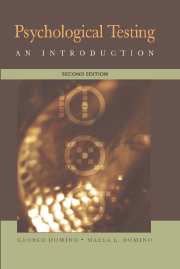Book contents
- Frontmatter
- Contents
- Preface
- Acknowledgments
- PART ONE BASIC ISSUES
- PART TWO DIMENSIONS OF TESTING
- 4 Personality
- 5 Cognition
- 6 Attitudes, Values, and Interests
- 7 Psychopathology
- 8 Normal Positive Functioning
- PART THREE APPLICATIONS OF TESTING
- PART FOUR THE SETTINGS
- PART FIVE CHALLENGES TO TESTING
- Appendix: Table to Translate Difficulty Level of a Test Item into a z Score
- References
- Test Index
- Index of Acronyms
- Subject Index
- References
5 - Cognition
from PART TWO - DIMENSIONS OF TESTING
Published online by Cambridge University Press: 05 June 2012
- Frontmatter
- Contents
- Preface
- Acknowledgments
- PART ONE BASIC ISSUES
- PART TWO DIMENSIONS OF TESTING
- 4 Personality
- 5 Cognition
- 6 Attitudes, Values, and Interests
- 7 Psychopathology
- 8 Normal Positive Functioning
- PART THREE APPLICATIONS OF TESTING
- PART FOUR THE SETTINGS
- PART FIVE CHALLENGES TO TESTING
- Appendix: Table to Translate Difficulty Level of a Test Item into a z Score
- References
- Test Index
- Index of Acronyms
- Subject Index
- References
Summary
AIM In this chapter we focus on the assessment of cognitive abilities, primarily intelligence. We take a brief look at various basic issues, some theories, and some representative instruments. We see that the assessment of intelligence is in a state of flux, partly because of and partly parallel to the changes that are taking place in the field of cognitive psychology.
INTRODUCTION
If you thought personality was difficult to define and a topic filled with questions for which there are no agreed-upon answers, then cognition, and more specifically intelligence, is an even more convoluted topic.
Not only is there no agreed-upon definition of intelligence, but the discoveries and findings of cognitive psychology are coming so fast that any snapshot of the field would be outdated even before it is developed. Fortunately for textbook writers, the field of testing is in many ways slow-moving, and practitioners do not readily embrace new instruments, so much of what is covered in this chapter will not be readily outdated.
In the field of intelligence, a multitude of theoretical systems compete with each other, great debate exists about the limits that heredity and environment impose upon intelligence as well as substantial argument as to whether intelligence is unitary or composed of multiple processes (A. S. Kaufman, 1990; Sternberg, 1985; 1988a; Wolman, 1985). It is somewhat of a paradox that despite all the turbulent arguments and differing viewpoints, the testing of intelligence is currently dominated basically by two tests: the Stanford-Binet and the Wechsler series.
Information
- Type
- Chapter
- Information
- Psychological TestingAn Introduction, pp. 92 - 126Publisher: Cambridge University PressPrint publication year: 2006
